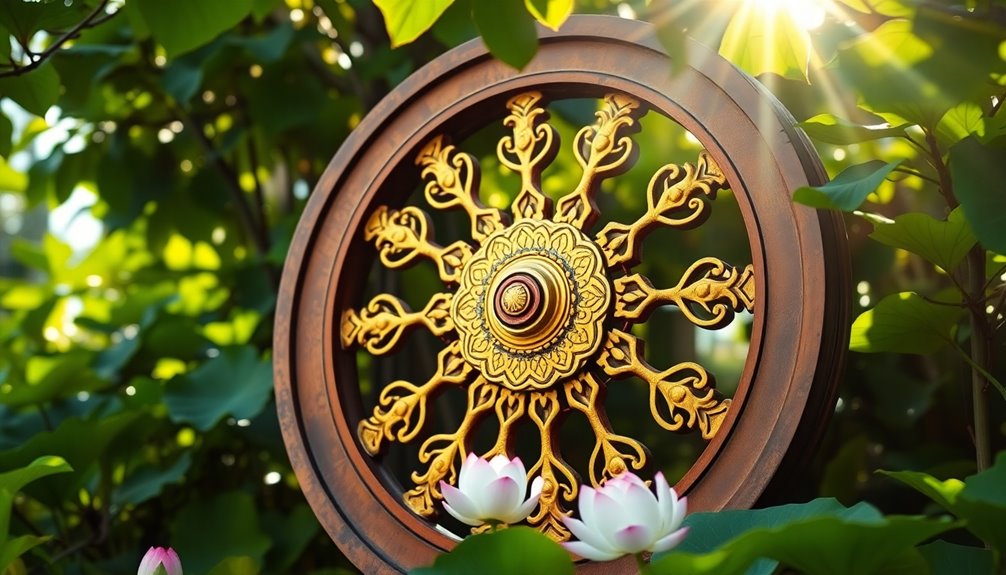Working with lineage and generational trauma involves uncovering hidden family patterns, secrets, and beliefs that influence your life today. By acknowledging these inherited influences, you can identify emotions and behaviors rooted in your ancestors’ experiences. Healing happens through reflection, awareness, and possibly therapeutic or spiritual practices that release old wounds. As you explore your roots, you’ll gain clarity and empowerment. If you continue exploring, you’ll discover practical steps to integrate this understanding and foster genuine healing.
Key Takeaways
- Exploring family history uncovers hidden patterns, beliefs, and traumas passed through generations that influence current behaviors.
- Recognizing and integrating family secrets helps release emotional burdens and promotes healing.
- Consciously examining inherited attitudes clarifies personal values versus ancestral influences.
- Engaging in reflective practices, therapy, or spiritual work facilitates the processing of generational trauma.
- Healing lineage trauma fosters healthier relationships, personal empowerment, and a more authentic life.

Have you ever wondered how your ancestors’ experiences influence your life today? It’s a question that taps into the deep roots of your lineage, revealing a web of cultural inheritance and family secrets that shape your identity in ways you might not even realize. When you begin exploring your ancestral history, you start to uncover patterns, beliefs, and emotions passed down through generations. These are often embedded in family secrets—hidden truths kept quiet to protect or preserve the family’s reputation, yet they silently impact your worldview and behaviors. Recognizing this inheritance allows you to see how unresolved trauma or unspoken stories continue to influence your choices, relationships, and sense of self.
Exploring your ancestors reveals hidden patterns, beliefs, and secrets shaping your identity today.
Understanding cultural inheritance is a *vital* part of ancestral healing. It involves more than just knowing where you come from; it’s about acknowledging how traditions, values, and collective beliefs from your ancestors are woven into your daily life. For example, you might carry forward specific familial attitudes about success, love, or conflict, often without realizing it. These inherited patterns can sometimes be limiting, causing you to repeat cycles or feel disconnected from your authentic self. By consciously examining these cultural influences, you begin to distinguish between what truly resonates with you and what was simply handed down.
Family secrets play a significant role in this process, often acting as silent barriers to healing. Secrets about past hardships, illnesses, or even betrayals can create a shadow over your family history, fostering feelings of shame or confusion. These concealed stories might have been kept to protect loved ones or avoid shame, but they can also create an unspoken weight that impacts your emotional well-being. When you acknowledge and bring these secrets into the light, you give yourself the opportunity to release their hold, understanding that healing begins with honesty—both with yourself and your ancestors. Recognizing how family secrets influence your perceptions can be a powerful step toward liberation.
Working through these layers of cultural inheritance and family secrets isn’t easy, but it’s *fundamental* for true healing. It involves heartfelt reflection, sometimes guided by therapy, ancestral work, or spiritual practices. As you piece together your family’s story, you start to see how generational trauma may have been passed down, and you gain power over it. This process enables you to break free from old patterns, honor your ancestors’ struggles, and forge a healthier, more authentic path forward. In doing so, you not only heal yourself but also create space for future generations to thrive without the burdens of unresolved family secrets or inherited trauma.
Frequently Asked Questions
How Can I Identify Unresolved Ancestral Trauma in My Family?
You can identify unresolved ancestral trauma by paying attention to family secrets and recurring patterns. Notice if certain behaviors, fears, or struggles seem to pass down through generations. Listen carefully to stories that are avoided or silenced, and observe any emotional or physical issues that persist. These clues often reveal underlying unresolved trauma, helping you recognize where healing might be needed in your family lineage.
What Are Effective Tools for Communicating With Ancestors During Healing Work?
You can communicate with ancestors during healing work through dream journaling and ritual creation. Keep a dream journal to record messages or symbols from your dreams, which often carry ancestral guidance. Additionally, create personalized rituals like lighting candles, offering symbolic items, or reciting affirmations to invite ancestral presence. These practices foster a deeper connection, helping you receive insights and support from your lineage during your healing journey.
Can Ancestral Healing Impact My Current Mental Health Issues?
Think of ancestral healing as clearing a fog that shadows your mind. It can profoundly impact your mental health by unraveling generational patterns and emotional inheritance that weigh you down. As you release these inherited burdens, you create space for clarity and resilience. This process helps you break free from old cycles, empowering you to nurture your well-being and rewrite your story with newfound strength and understanding.
How Long Does It Typically Take to See Results From Ancestral Healing Practices?
You might see results from ancestral healing practices in a few months to a year, but it varies based on your unique journey. Timeline expectations differ; some notice emotional shifts and healing milestones quickly, while others experience gradual progress. Consistency is key, and patience helps you honor your process. Trust that with ongoing effort, you’ll gradually uncover deep insights and experience meaningful healing as you work through lineage and generational trauma.
Are There Cultural Considerations or Sensitivities to Be Aware of in Ancestral Healing?
Yes, there are cultural sensitivities to take into account in ancestral healing. You should approach these practices with respect and awareness of the traditions involved. Avoid appropriating or misrepresenting cultural elements, and seek guidance from community elders or cultural advisors when possible. Being mindful of different beliefs and customs ensures your approach remains respectful, fostering genuine healing without causing offense or misunderstanding.
Conclusion
By embracing ancestral healing, you release a power so profound it can reshape your entire life, clearing the tangled webs of lineage and trauma like a mighty storm sweeping through a dense forest. You hold the key to transforming generations of pain into newfound strength and wisdom. Remember, your willingness to face and heal your lineage isn’t just a gift to yourself—it’s a revolution that echoes through eternity, illuminating the path for those yet to come.










